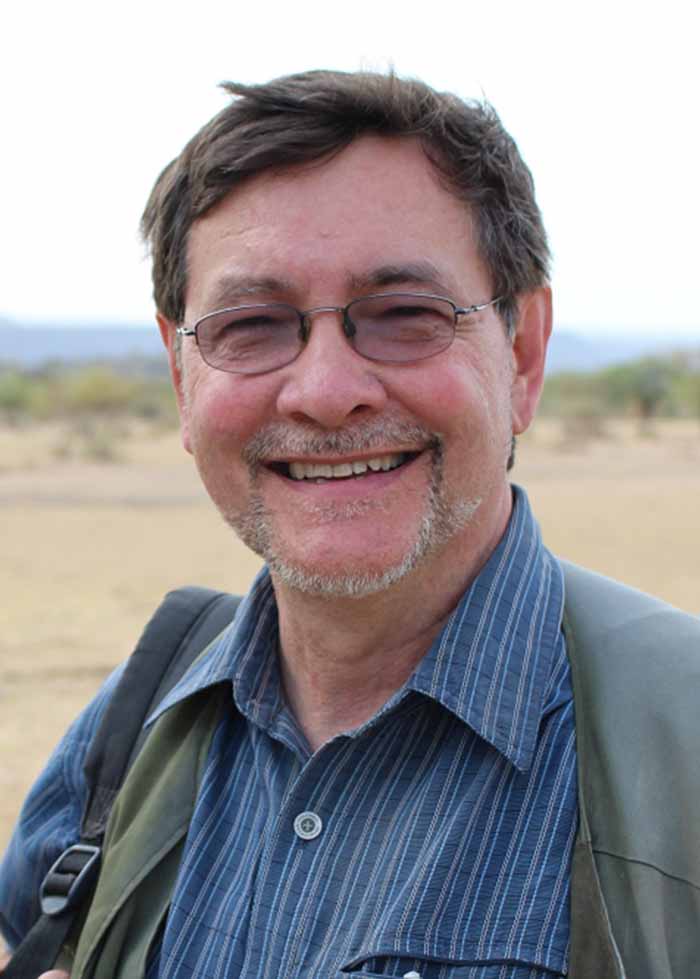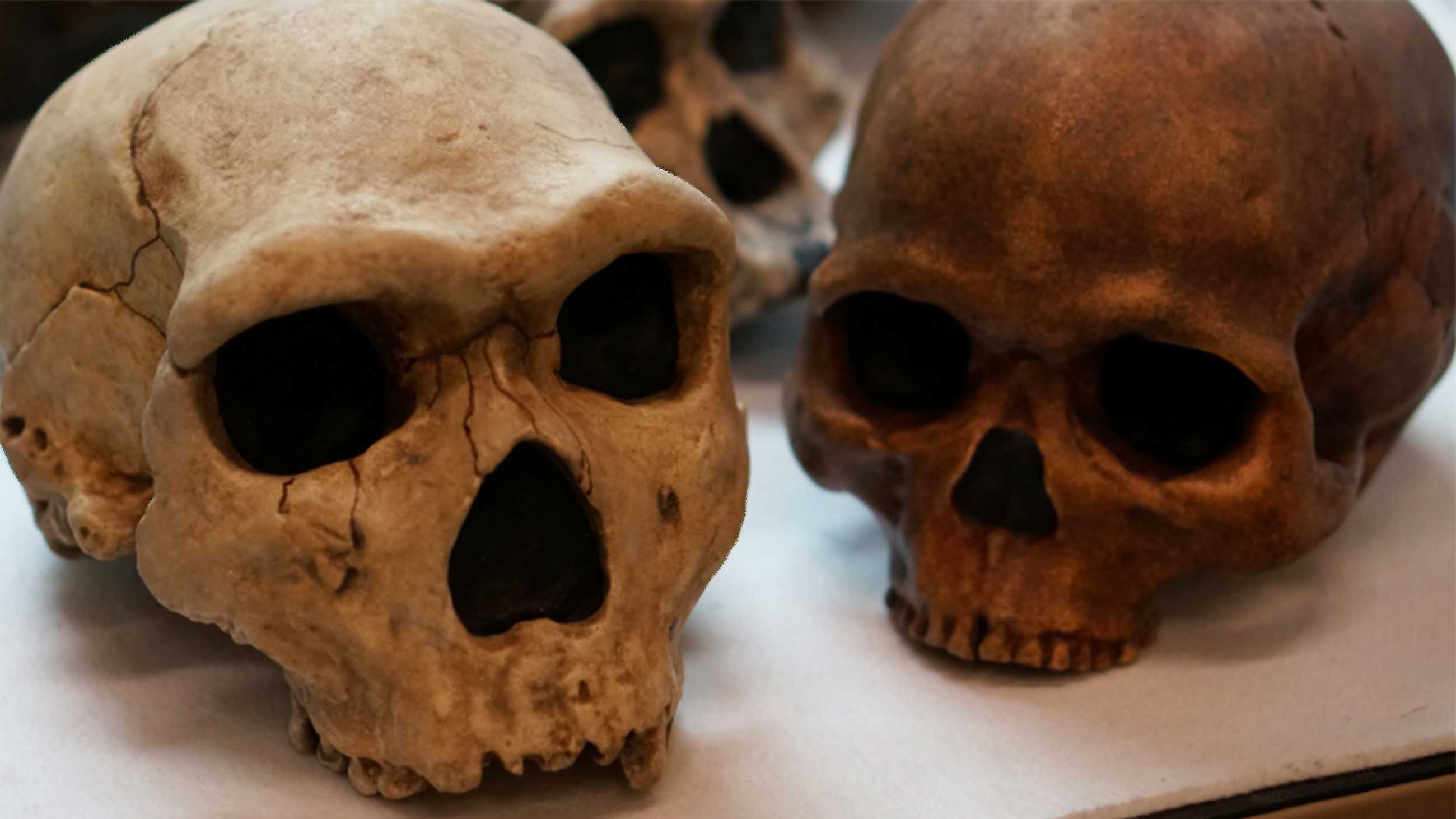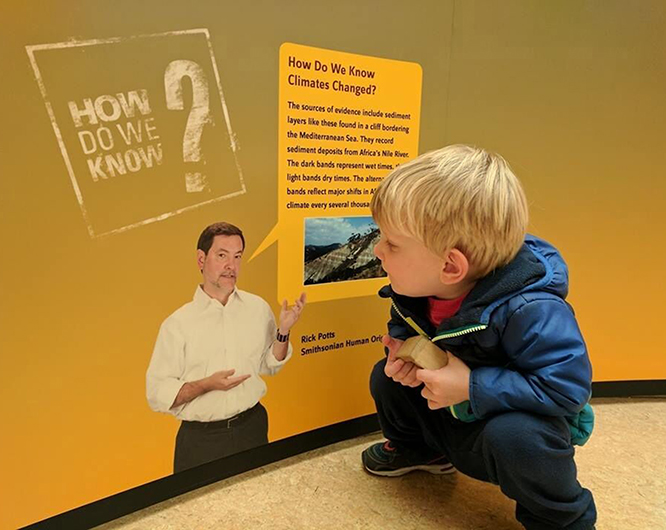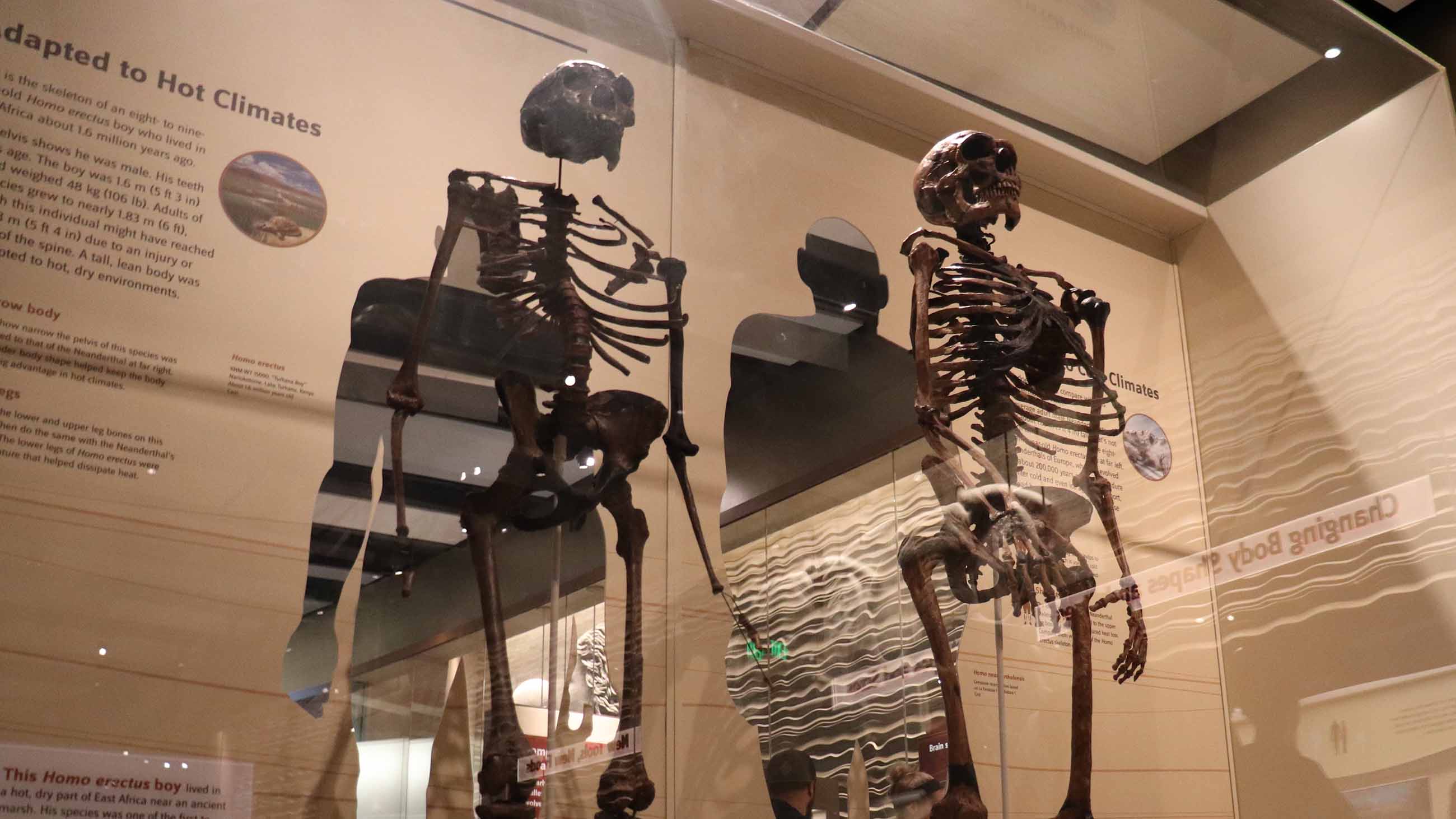Speaking of Evolution, in Non-Threatening Tones
Rick Potts is no atheist-evolutionist-Darwinist. That often comes as a surprise to the faith communities he works with as head of the National Museum of Natural History’s Human Origins Program in Washington, D.C.
Raised Protestant — with, he likes to say, “an emphasis on the ‘protest’” — the paleoanthropologist spends his weekends singing in a choir that sings both sacred and secular songs. At 18, he became a conscientious objector to the Vietnam War, because he felt it was antithetical to people trying to understand each other. In college, he studied comparative religion. “I wanted to understand that universality of human beings,” he explains, framed by the early hominin skull casts that line his office on the National Mall. “How do you understand all of human beings as a totality, rather than the divisions between people?”
That’s why, for him, human evolution is the perfect topic to break down entrenched barriers between people in an increasingly polarized, politicized world.
Potts first joined the Smithsonian Institution, the United States’ vast network of public museums and research centers, back in 1985, and he knew he wanted to create a new kind of human evolution exhibit — one that went beyond phylogeny and taxonomy. The hall’s lofty title — “What Does It Mean To Be Human?” is no accident. “Ours is the only one to ask that larger question,” he says of the installation.
Still, by 2010 Potts says he realized that the only people coming to the exhibit were those who had no quarrel with the science of evolution. In order to reach the more than one-hundred million Americans who still question that science, he would have to take the evidence — carefully packaged — to them.
Such was the origin of the Human Origins Traveling Exhibit, which wrapped up last year. The idea was to bring key parts of the permanent installation in the nation’s capital to diverse communities, including ones that were rural, religious, remote. At least 10 of the 19 sites the Smithsonian visited were deemed “challenging” — places where the researchers suspected that evolution might still be a contentious subject, for religious or other reasons. The exhibit would be accompanied by a team of clergy members and scientists handpicked by the Smithsonian, and they would engage the public and local clergy in conversations about this fraught topic.
This project was funded in part by the John Templeton Foundation, a wealthy group that backs efforts to bring religion and science into harmony, as well as the Smithsonian’s Peter Buck Fund for Human Origins Research. Part of the stated goal was straightforward science education. After all, evolutionary theory is the backbone of chemistry and biology, the through-line that makes sense of all the sciences. Human evolution is also “one of the highest hurdles — if not the highest hurdle — to science education in America,” says Potts, a 64-year-old with wire-rim glasses and a gentle demeanor.
But merely teaching evolutionary science wasn’t the point. Potts was going for something more subtle: Not conversion, but conversation.
“Our goal is to lower the temperature,” he says.



If you aren’t caught on one side of the evolution debates, it can be hard to grasp what all the fuss is about. Here’s the short version: Charles Darwin’s crime wasn’t disproving God. Rather, the evolutionary theory he espoused in “On the Origin of Species” rendered God unnecessary. Darwin provided an explanation for life’s origins — and, more problematically, the origins of humanity — that didn’t require a creator.
What would Darwin think if he could see the evolution wars rage today? If he knew that, year after year, national polls find a third of Americans believe that humans have always existed in their current form? (In many religious groups, that number is far higher.) That, among all Western nations, only Turkey is more likely than the United States to flat-out reject the notion of human evolution?
Those who research the topic call this paradigm the “conflict mode” because it pits religion and science against each other, with little room for discussion. And researchers are starting to realize that it does little to illuminate the science of evolution for those who need it most. “Acceptance is my goal,” says Jamie Jensen, an associate professor who teaches undergraduate biology at Brigham Young University. Nearly all Jensen’s students identify as Mormon. “By the end of Biology 101, they can answer all the questions really well, but they don’t believe a word I say,” she says. “If they don’t accept it as being real, then they’re not willing to make important decisions based on evolution — like whether or not to vaccinate their child or give them antibiotics.”
In 2017, biology education researchers at Arizona State University tested whether teaching strategies could lower this sense of conflict. For a study, they added two-week modules in biology classes to directly address students’ philosophical roadblocks and brought in contemporary scientists with religious backgrounds. By the end of the class, the authors noted in a paper, students who perceived a conflict were reduced by half, leading them to conclude that discussing the compatibility of religion and evolution “can have a positive impact on students that may extend beyond the classroom.”
This work is part of a wider movement seeking to bridge the gap between evolutionary science and religion — whether real or perceived. The big players include the BioLogos Foundation, an organization that stresses the compatibility of Christianity and science founded by the director of the National Institutes of Health, Francis Collins, who is an Evangelical Christian, and the American Association for the Advancement of Science’s Dialogue on Science, Ethics and Religion (DoSER), a program that aims to encourage science dialogues within faith communities.
These groups recognize that cultural barriers, not a lack of education, are what’s preventing more Americans from accepting evolution. “I never want to downplay the importance of teaching our students evolution, I think it’s the most important thing we do,” says Elizabeth Barnes, one of the co-authors of the biology education paper. “But it’s not enough if we want students to actually accept evolution.”

The National Museum of Natural History’s traveling evolution exhibit may be among the most ambitious efforts to bridge the science-faith divide. The idea of going from a debate to a conversation “is a game changer, in terms of the rules of how you listen and how you talk to someone,” says Potts. To do that, he sought to bring human evolution not only to people who wanted to hear about it, but to those who really, really didn’t.
“We knew there’d be backlash,” says Penny Talbert, a 47-year old who was born into a Pennsylvania Dutch family and now works as a librarian and executive director of the Ephrata Public Library in Pennsylvania. “We didn’t expect the anger.”
Of all the communities chosen to host the Smithsonian exhibit in 2015, Ephrata would prove to be the most challenging. The town, which means “fruitful” and gets its name from the biblical site of Ephrath, is in the heart of Amish country. Most of its residents are conservative Christian and Anabaptist (Amish, Mennonite, Brethren); more than 70 percent voted for Donald Trump. Ephrata was also the only town that staged a substantial boycott to the Smithsonian exhibit, which included touch-screen kiosks, casts of prehistoric skulls, and a panel pointing out that Homo sapiens share 60 percent of their genes with bananas, 85 percent with mice, and 75 percent with chickens.
But it was a near life-sized likeness of a female Neanderthal and her naked child that sparked the most furor among the 30,000 people in the area the library serves. The reproduced statue was stationed at the library’s front entrance on a wooden support. When families entered, they would often cover their children’s eyes throughout the exhibit. A group called Young Earth Action started a website called “The Devil Comes to Ephrata,” and an editorial in the local paper accused Talbert of “waging spiritual warfare” on her community.
“What troubled me most was your statue of a naked little boy and lady — right as you walk into the library,” one woman wrote to the library’s board. “I was shocked. Our local library should be a safe place for our children, not a place where we have to worry what our children will see when we come into the library.” The letter was signed, “A Troubled Mom.”


When I visited Talbert last summer, I asked her if she could think of any topic more offensive to her community than human evolution. She was wearing jeans and maroon sunglasses; her hair was brown and streaked with gray.
“Library abortions would probably be more offensive,” Talbert replied, “but that would probably be it.”
Of course, no one who comes to the Human Origins exhibit enters as a blank slate; visitors come in shaped by a lifetime of culture and environment. And a growing body of scientific research suggests that facts don’t change people’s beliefs — particularly when those beliefs are wrapped up in their sense of core identity.
“In what has become a relatively contentious society, can we create spaces when people who have serious and profound differences in views can actually engage each other in conversation?” asks Jim Miller, the president of the Presbyterian Association on Science, Technology, and the Christian Faith and an adviser for the Human Origins Program. The hope, Miller says, is “that we can reach not necessarily a level of agreement, but some level of understanding.”
Dan Kahan, a science communication expert at Yale Law School, thinks that’s possible, but only if we abandon some tired rhetorical terrain. Asking people whether or not they “believe” in evolution is the wrong question, Kahan’s work suggests, because it forces them to decide between what they know and who they are.
When I told Kahan about the Smithsonian’s project, he agreed with the premise. “I think the organizers are hitting on a really important point, which is that you don’t want to put people in the position of choosing between what science knows and being who you are as a member of the social community,” he says.
“In fact, the literature suggests that’s the worst thing you can do if you want people who have that identity to openly engage with evolution,” he adds.
Better, he suggests, to ask these communities how they think science would explain the mechanisms behind evolution. “Science should be true to science, and then figure out how to make the experience as accessible as possible to as many diverse people as they can,” Kahan says. This involves “teaching them what science knows, you’re not making them into another person.”
Rick Potts provides a video short introduction to some of the evidence for human evolution, in the form of fossils and artifacts.
About halfway through the Human Origins Hall is an interactive kiosk that asks the titular question, “What does it mean to be human?” Here, visitors can view past responses: “We appreciate beauty,” reads one. “To believe in right versus wrong,” says another. “Write poetry and equations … To create and talk incessantly about it … Imagine the impossible … Laughter … To weep for the loss of a loved one … Understand our connection to other living creatures.”
Then visitors are invited to write in their own answers. Many of these, which appear on the Human Origins website, are God-focused, anti-evolution, or have nothing to do with science, but that doesn’t bother Potts. Of course, he’d like to see a society that more readily accepts the science of evolution. “But my philosophy about that is that acceptance has to come from within,” he says. “It doesn’t come from an external effort to gain acceptance.”
What can come from the outside is understanding through conversation. Even in Ephrata, Talbert suggests, the biggest surprise was how much engagement there was around the exhibit. “Not everyone left those conversations feeling incredibly thrilled,” Talbert says, “but I think they all left feeling like they’d been heard.”
And for Potts, that has always been the goal: to change the national rhetoric from a roiling debate to a simmering conversation. “The conflict mode is something we have inherited from past generations, and it’s really up to us whether we want to continue that,” he says. “You have a choice.”
An earlier version of this article incorrectly rendered the name of the American Association for the Advancement of Science. The story has been updated.
Rachel E. Gross is the online science editor at Smithsonian Magazine in Washington, D.C. She was previously a reporter for Slate Magazine, a researcher at WIRED Magazine, and a blogger at The New York Times. Her work has appeared in The Atlantic, National Geographic, New Scientist, Science, and The Jewish Daily Forward.











Comments are automatically closed one year after article publication. Archived comments are below.
As I get older and my testosterone levels equilibrate to lower levels, I managed to stumble across the approach advocated here, with great success.
Bottom line: Intelligent Design (aka Creationism-lite) cannot explain Botanical diversity. Students’ typical response: “OK, I get it… Plants diversity clearly reveal an “unintelligently designed” evolutionary history- just don’t tell me I am descended from a Chimpanzee.”
Answer: NOMA as described by Stephen Jay Gould
This article shows the incredible arrogance and insensitivity of the evolutionary community. The approach is worthy of the best of Nazi or Monsanto or Trump double-speak. Where to begin?
First: the presupposition is that evolution is right.
Second: the tactic is to frame the debate as making cordiality the theme of the day, rather than conflict.
Third: this is the classic Trojan Horse. You see, the real goal here is to get Christians to quit believing the Bible and admit that evolution is right.
THE BOTTOM LINE MESSAGE IS THIS: “OH HI! HEY, LAY DOWN YOUR SWORD, I’M NICE, LET’S TALK. NO, NO NEED FOR ME TO LAY DOWN MY SWORD. HERE, LET ME TAKE CONTROL OF THE SITUATION AND THE AGENDA. OH, LET’S MAKE SURE YOU DON’T WIELD YOUR SWORD, HERE’S JUST A NICE LITTLE SHOT OF MY SPECIAL MIX OF CALMY-JUICE. OH, i DON’T NEED TO DRINK ANY. NOW HERE, LET ME TAKE OUT MY SWORD AND GENTLY PUT IT AGAINST YOUR THROAT. ISN’T IS PRETTY? OH, YOUR SWORD IS KIND OF NICE IN A FUNNY WAY, BUT HERE…LET ME PUSH A LITTLE HARDER. YOU SAY IT HURTS? OH–LETS DIALOGUE ABOUT THAT! I HAVE A NICE MANUAL ON HOW TO HANDLE CONFLICT WITH RELIGIOUS PEOPLE WRITTEN BY SATA….URMPHH!…I MEAN SPECIALISTS IN CONFLICT RESOLUTION. YOU AREN’T REALLY FEELING PAIN, YOU ARE JUST IN THE NORMAL STATE EPPERIENCED WHEN YOU ARE BEING TEMPTED BY SERVANTS OF SATA….URMPHH!…I MEAN BY THOSE WHO TRYING TO HELP YOU REDUCE YOUR PROBLEMS OF SELF-ESTEEM EXPERIENCED WHEN THERE IS A PARADIGM SHIFT PRESENTED TO YOU…
I studied evolutionary biology at Reed College under the late Dr. Bertram Brehm. Totally bought the whole thing. Then the Lord opened my eyes, I believed in Jesus, that He died on the cross for our sins and rose again…and my eyes were opened. I love nature and true science more now than I did then. Dyneins! Mu mesons! And…fossils.
And the evidence is solidly AGAINST evolution! But where are these so called “peace-makers” when it comes to seriously examining the evidence that points to a universal flood 6,000 years ago, and rapid burial of vast amounts of plant and animal life? Where is their so-called equanimity when it comes to explaining the vast number of people groups around the world with a flood story? Where is their presenting the evidence that suddenly, all the major civilizations arose approximately 2500 BC, and there is no true history before that, exactly in the Genesis literal timeline? Where is their admission that the statistics are entirely against the development of the cell, with its vast array of interdependent structures and processes, such as dyneins, ribosomes, lipid rafts, and other complexities that we have just scratched the surface of? Where are the frank admissions of the hoaxes that the “scientific community” fell for, because they were so ravenous for some proof that their godless theory was correct?
Then, to display nudity in a public library in the heart of Amish country! The incredible arrogance and insensitivity! If some right-wing looney were to build a Nazi Museum in Jerusalem, or erect a gleaming monument to the Klu Klux Klan in Birmingham or Detroit, the liberals would be (rightly) up in arms! But no, we can try to foist our irreligiousity, our lack of morals, our licentiousness, on a community everybody knows has very strict rules about modesty…and its just …well…THEIR problem! The hubris of the irreligious and liberal is truly monumental.
But, when you are serving Sata…urmphh…you don’t play fair, because he doesn’t.
You can run this mind-mush all you want. The fact is, the Bible is true, as written. It is true that evolution is the most asinine pseudo-science every perpetrated. It is true that there is bigotry rampant in the scientific community against the fact of the truth of the Bible: but the root of it is NOT intellectual, it is spiritual. Their are two kingdoms, with two masters: Christ and Satan. You are in one or the other. Until Christ returns, this planet is a battlefield. You can tempt–yes, tempt–people to your point of view with such suave sophistries, but the peace you hope for is not available. You can deceive, but that is all it is.
Or, best of all, you can do what I did. Repent, and believe in Jesus. And then enjoy the creation 1000X more, because now geology and paleontology and biology and astronomy and microbiology all point to the Creator, and the record of the Flood, followed by the division of the earth in the days of Peleg (Genesis 10:25, appx 100 yrs post-flood) totally make sense of the vast landscape!
Gene Cole. Do you have any real evidence that humans and chimps can not interbreed? Obviously it would be very unlikely that anyone would admit to having tried to interbreed apes and humans. Most people would find this unethical and repugnant. It is not entirely unlikely that such a cross would at least in some cases produce offspring. We share a huge number of genes in common and most of them at similar loci. It is most unlikely that the progeny of such a cross would be fertile because of the different chromosome numbers of the two species. by the way, do you believe chimps and gorillas share common ancestry as they do have the same chromosome number? Has anyone tried that cross, or a cross between chimps and bonobos? By the way, inability to interbreed in no way precludes two species from sharing a common ancestor. It merely signifies that sufficient evolution (i.e. changes in gene frequencies, number of mutations and changes in positions of genes on chromosomes) has occured that the potential hybrid has a genome which has too many conflicts to produce a viable organism
A very interesting and thought-provoking article! As a Christian (feel free to stop reading ;) it seems to me that the debate is not between science and religion but between two opposing views of origins, i.e. evolution and creationism.
The fact (and I use the word deliberately) is that we all have the same evidence and that evidence exists in the present. All we can do is interpret the evidence in the way that makes the most sense. But we need to also consider that we bring our individual bias into that interpretation.
A creationist view of origins will lead us to interpret the evidence from that perspective and an evolutionary view of origins will do likewise.
Can one side prove their view to the other? No.
Can creationists bring the scientific method to bear on their interpretation? Absolutely and as fully as evolutionists.
And rather than one side shouting down the other, we need to give space to both, as Michael Balter proposed.
Because none of us can claim to know the full story and all of us only have snippets of the truth.
In an age of “tolerance”, here’s an opportunity to practise that!
I would love to know how we can scientifically test the claim that humans have non-humans as ancestors. Some people will point to the similarities but those are evidence for a common design. What is required is evidence that genetic changes can produce the anatomical and physiological DIFFERENCES observed between chimps and humans. Both genomes have been sequenced and yet no one has been able to connect the genetic differences to the anatomical and physiological differences observed. So that is a problem as far as science is concerned.
In reply to Gene Cole, I would argue against your point. For something to be a different species, that means it is genetically distinct enough that if two members of two species were to mate, the genetic differences are great enough to prevent any potential offspring from being fertile. For example, lions and tigers are different species even though they can mate and produce a hybrid animal, such as the liger. The liger is sterile and cannot reproduce, which makes the lion and tiger incompatible, genetically. In the case of apes and humans, or humans and chimps, we are genetically different enough that fertile offspring are impossible, so that makes us separate species. However, when you compare our genetic sequences, our genomes are more similar to apes and chimpanzees than to say, lions, so we have a more recent common ancestor with apes and chimpanzees than to lions. Really, your point actually provides evidence against the misconception about evolution that we evolved from chimpanzees. We never evolved from chimpanzees, rather we just both share a common ancestor, hence why we are genetically similar but could never have fertile offspring.
The primary proof that mankind (humans) did NOT! “Evolve” from apes is that in-breeding (inter-breeding) is only possible when different species both have a common ancestor somewhere in their distant past (up to millions and millions of years ago).
Without a common ancestor, cross-species inter-breeding is genetically impossible.
So since it is a fact that apes and mankind (humans) cannot inter-breed, because they have NO common ancestor, this fact is the strongest proof that mankind (humans) did NOT! “Evolve” from apes.
Too bad, Darwin!
Again, the arguments asserting the descent from chimps, the impossibility of interbreeding et al as proof that evolutions is false rings hollow in the that those using it to refute that evolution seem to understand little of how it works.
The commentor would instead ask that of both faith and science to consider under what condition(s) might evolution be compatible with assertions of intelligent design? bearing in mind that the Roman Catholic Church has no issues with this coexistence.
@Jackrabbit, if morality isn’t a construct defined by society, then what is it?
I am a scientist and Christian and easily reconcile the two. My scientific discipline is geophysics. My spiritual tradition is Lutheranism. The key element of both my science and religion is captured in the phase “Embrace the mystery.”
Both science and religion are models that describe reality. They give us vocabularies to describe our experiences, but both are incomplete. It is presumptuous to talk about scientific or religious “truth”. We have observational data of the natural world that provide validation of our scientific models, inferences to refine these models, leading to new experiments of further validation or refinement. Occasionally we go through radical paradigm shifts that upend our models; modern examples include evolution, quantum physics, and plate tectonics. Our spiritual models have also experienced major paradigm shifts over the history of mankind, but these do not have the same kind of predictive power, observational validation, and model refinement that are inherent in scientific disciplines.
I applaud Rick Potts’ efforts to promote less confrontational dialog in the evolution-creationism debate. Both the scientific and religious communities would be more effective at influencing our society if they could concede the limitations of their models.
I recommend the recent PBS Point of View documentary “Bill Nye: Science Guy.” The first sentence of the synopsis is “Bill Nye is a man on a mission: to stop the spread of anti-scientific thinking across the world.” It contains segments on Nye’s very public and confrontational debates with Ken Ham on evolution/creationism and Joe Basardi on climate change. I appreciate Nye’s enlightened interpretation of the data and science, but I am left wondering how effective his approach is at winning over the skeptics. The public policy and school curriculum issues are huge and the entrenched interests need to be confronted, but I have doubts whether his approach is effective.
KR, a really good question. Evolution actually isn’t the backbone of any of the sciences, empiricism is. Evolution presents an interesting problem though. Science works by putting up theories and then those theories are empirically evaluated and either knocked down and replaced with better theories, or further strengthened. Notice though that no scientific theory is ever “safe” from being disproved, it just is permitted to stand until a better understanding of things comes along.
Evolutionary theory though doesn’t play by the rules. While there is good science mixed in there (like the idea of natural selection) there are elements mixed in which cannot be empirically verified OR disproved. So evolutionary theory stands by default because elements of it CANNOT be knocked down empirically. This is really kind of cheating and not what science was ever supposed to be. But there are a great many people who have a vested interest in evolutionary theory being recognized as truth.
People often wonder what the “big deal” about evolution is, and why evolutionists can’t “play nice” with religion; it’s not enough for hard-core materialists to stick to their science; they often have to try to destroy religion also (like Bill Nye, the “science” guy). The truth though is that evolutionary thinking is an attempt to supplant morality and God’s authority. If it can be “scientifically” demonstrated that humans are just another type of animal and that our morals evolved like every other aspect of our society, then those morals are ultimately relative and not binding. Morality becomes a construct defined by society. But that is a dangerous place to be. Thank God we are not quite there yet.
The assertion that evolutionary theory “does not play by the rules (of Science)” is not altogether accurate since material evidence does indeed strongly support it. What is certainly not supported so far is that there is indeed a divine hand the had or is machinating the universe.
Question: The author asserts “After all, evolutionary theory is the backbone of chemistry…”. How so?
Dave, a good question and looking back I fear that I may not have presented my line of thinking as clearly in my previous post as I would have wished. My proposed dichotomy should have been clearer: either we have an unbroken chain of causation stretching back INFINITELY through the distant past, or at some point we have an INFINITE Source / Prime Mover / Uncaused First Cause. In this view everything begins with that First Cause, which is itself Uncaused. God has no origins and no creator.
At this point you might ask me to scientifically substantiate this possibility that reason brings us to, but in all honesty I cannot. But neither can anyone empirically substantiate a more materialistic view of origins either. You see, faith is built into the system. You can put your faith in the intellect and authority of human science, or you may put it in God and His Word, or you may put it in something else, or nothing else, altogether. The choice of what to put your faith in, however, will not determine reality. No, reality will rather determine the consequences of your choice. God persists despite all human efforts to erase Him.
Jackrabbit, I guess now is the time to ask “Where did God come from?” If everything came from a previous living thing then, logically, even God came from something. And that something is/was…………? I await breathlessly for your answer. Cosmologists have put forward several scenarios of what came before the Big Bang. At least they are trying and, I believe, will one day have an answer. There is a logical explanation for everything. Even Stephen Hawking proved in his book “The Grand Design” that there doesn’t need to be a “God” for the Universe to happen.
Christian, your view of humanity and religion is too simplistic. It’s like saying that water always runs downhill, but ignoring the fact that evaporation or that water getting trapped in pools could happen. Specifically, you assume that human beings are basically honest, logical, and truth-seeking, but while humans sometimes have these inclinations, there are balancing forces that do not lead to ideal conclusion of everyone arriving at truth.
Namely sin is the primary force that keeps humans from spiritual truth. Since the Fall and humanity’s rejection of God and His law, human beings have a tendency to make themselves into gods. Most human religions are therefore man-centered: man must DO X, Y, and Z to ACCOMPLISH and EARN divine favor. Add in the tendency of human beings to want to elevate themselves above others and to use religion to manipulate others into subservience, and suddenly it becomes very difficult (impossible actually) for fallen humanity to arrive at spiritual truth apart from divine intervention.
Christ told some of His listeners that they were of their father the Devil, a LIAR and a murderer from the beginning. The Bible tells us that the primary characteristic of the human heart is that it is DECEITFUL and desperately WICKED. This is why the whole world has not inclined towards truth.
I tend to lean toward the idea that God could have caused evolution. I don’t have to challenge my core and can accept science at once. I think it is possible that God caused the something from nothing, and helped everything evolve. I view science as a lens through which we can understand God, and I think that God makes science and uses it to do things. It’s a both-and situation for me.
Oh dear “god”. People’s rush to jump to miracles of Jesus’s ressurection and god revealing himself are hilarious when it comes to scientific articles. These people firstly have no cognition of the spread human cultures (including religious narratives) and the theological and cosmological implications of such beliefs.
If the bible were true and a singular entity has been speaking to and through humanity (by prayer, revelations, and miracles) since ALWAYS and that voice is and has been unchanging, humanity would have worshipped and came up with a singular diety FIRST and would have practiced and preached the worship of that singular diety since ALWAYS and every GEOGRAPHICALLY SEPARATE culture of humans that developed their own variety of religions would have all written almost exacting copies of the bible at the advent of writing leading ultimately to Jesus without ever having to come into contact with one another.
NOWHERE, Nowhere, nowhere in the history of religions across human cultures is this true.
Abiogenesis does not posit life came from nothing. It very much does posit life came from a serious of conditions that lead from organic chemistry to simple microbes to complex microbs to multicellular organisms, to the evolution of central notochords, digestive systems, light sensitive eye spots, antennae, functional organs all the way up to the diversity of life. So yes, it is very much about education and understanding why deeply held religious sensibilities and teachings are dead wrong and more importantly, why.
If something cannot arise from nothing, this applies to a complex, conscious singular entity too. You cannot assert complex thinking deity without an evolution or familial lineage leading to its own complexity.
I am a ‘Fundamentalist Evangelical’ and was asked to teach one HS Biology class using a book dated 1993. The first page of chapter four stated that ” LIFE CANNOT COME FROM NON LIFE” Then, 3 months later I was expected to teach chapter 11 Evolution where the first page said: “SCIENTISTS ARE NOT SURE HOW LIFE AROSE” No Shit. But at least I admired their honesty and I doubt that modern books would be so tentative.
I have a science degree and feel very strongly about this topic. There are two issues that are pertinent when evolutionists proclaim themselves on the side of ‘science’ and presume to educate those of us who are, by default, not on the side of real science. First is the presumption that I would believe in Evolution if I was both educated properly about it, and had not been brought up in a cultural milieu that denigrated it. This is very insulting to me and the many intelligent people I know that disavow evolution.
When Rachel Gross makes a statement such as ‘evolutionary theory is the backbone of chemistry and biology, the through-line that makes sense of all the sciences’ it made me spill my soup. Seriously, who believes a line like that?? And how can i have a serious conversation with a person who has drunk so much evolutionary Kool-Aid that they cannot discuss the many serious –nay fatal–flaws in the macro theory??
As a Christian (Who is not God) I do not presume to know everything, but I seek to know as much as I can. It seems obvious to me that things evolve, but it seems a lot less obvious that species can dramatically transform between each other; a T.Rex becomes a chicken and a hamster is my long lost cousin for example. I would not arrogantly assume that Evolutionary Theory explains human history and the case is settled, but I am certainly open to the discussion. I can’t seem to get over how Evolutionary Theory explains abiogenesis (creating something from nothing)? Can anyone enlighten me on how Evolutionary Theory tackles this without leaning on the debunked primordial soup ideas?
Dave, let us begin with reason and see how far that takes us, and then go from there. Look around; every living thing you see had a beginning and came from some other living thing. We are therefore left with two reasonable conclusions: either that there is an unbroken chain of causation, life begetting life, going back ad infinitum into the past, or that at some point in the past, there was a beginning to all life, a Source, a Prime Mover, an Uncaused First Cause. But here’s the thing, even secular scientists agree with the Bible (Genesis 1:1) that there WAS actually a beginning. They might call it the Big Bang, or whatever, but they will tell you the same thing that God’s Word does, that everything did, in fact, BEGIN.
We can extrapolate a great deal logically about this beginning, this Source. We see intelligence in the creatures and people around us; their Source must be intelligent. We see moral, emotional, and aesthetic capacity. We see foresight, purpose, intent. The Source of all life must therefore exhibit all these traits and qualities. We begin to see that the Source is not an impersonal force, but an actual Person. We are talking about God. And we see Him more clearly in His revealed Word, the Bible.
Salvation was not meant only for the Jews, but it was, for a time, “of the Jews” as Jesus Christ Himself said while He lived on earth. But the Hebrew Scriptures are clear that through Abraham’s seed ALL the nations of the earth would be blessed, not just God’s people the Jews. The Jews largely missed their Saviour, believing that He would be a revolutionary deliverer sent to free them from Roman oppression. But Jesus Christ was sent to free humanity from sin. This act accomplished on the Cross, Christ sits at the throne above waiting for the culmination of history, while His faith has spread throughout the entire world. The fact that the name of Jesus Christ is a household name is itself a miracle. There is no reason why you or I should remember the name of a mere carpenter’s son who lived 2000 years ago. But Jesus of Nazareth is the Christ, the promised one of God. Dave, Jesus Christ is the only thing that can save humanity from its inevitable destruction, a destruction that our own sin and wickedness will bring down upon us.
Notice the statement about wanting them to “believe” the theory. Notice the BY instructor who admitted his students knew the theory & vould answer all the questions, but was appalled that they didn’t Believe it!
This isn’t about real science (notice how everyone concerned here simply defines science as evolution!) But about control and belief. The religion of Darwinism must prevail and your tax dollars will be used to insure that it does.
When an evangelical like me says, “I don’t believe in evolution,” we are almost always immediately lambasted with “Say what?!” After all, it’s pretty obvious that organisms change over time; it’s pretty inane to deny that obvious truth. But what is overlooked is that the debate has never been about whether living things change over time, but how do they change over time. Modern evolutionary theory is a “package deal” – there’s some good science in there, but there’s a lot of very questionable truth-claims there also which cannot be scientifically, empirically substantiated. Here are some of those claims which evangelicals like me take exception to:
(1) Life from nonliving materials by purely naturalistic means. Now some of you will immediately jump on my case for saying this one, because “Evolutionary theory does NOT deal with the origins of life!” Correct, but the vast majority of those who buy into the modern evolutionary package deal believe this.
(2) A “billions of years” time scale to the universe. This claim simply cannot be scientifically substantiated. Many of you reading this will say, “But what about dating methods?” (No, not the romantic kind.) Actually if you have read about Carbon-14 dating or any other methodology, you can clearly see that numerous unwarranted starting assumptions are made in EVERY dating methodology.
(3) Human beings evolved from animals. My question to you: If number (1) could actually happen, life naturally occurring from nonliving materials, why couldn’t it happen multiple times, separately, in parallel? But no, we MUST believe that there is only ONE “tree of life” and that humans are a branch of that tree deriving from lower life forms. But this is a truth claim that cannot be substantiated empirically.
https://jackr4bb1t.wordpress.com/essays/genesis-1-versus-science/
Oh please. You people are making way too much out of this and wasting too much time doing so. Homo Sapien Sapiens have been around for 6-7 million years and its just been in the last approximately 40,000 years that we evolved “emotion” (the earliest that jewelry/paintings have been found). And you’re telling me that just 2,000 years ago the Creator decided to show it/her/his self to a relatively small group of people living in a relatively small area what we call today the Middle East? What about the rest of the human population on earth at the time? They didn’t deserve a Savior? And what happened to all the people who lived the previous 38,000 years not to mention the millions of years before? Your story is so incredibly shallow and will probably be the downfall of my Species. You can’t see that the truth lies in Science, Exploration and Knowledge. There is no Creator. There is no Intelligent Design. There is no Afterlife. TIME IS GETTING LATE!
Without question evolution, in fact confirming it, get ready for a shotgun marriage between science and religion that both sides of this seemingly intractable equation will find hard to swallow, but swallow they must. For what science and religion, not to mention the rest of us, thought impossible appears to have happened. History has its first literal, testable and fully demonstrable proof for faith and it’s on the web. And I’m TESTING it now for myself.
The first wholly new interpretation for two thousand years of the moral teachings of Christ has been published. Radically different from anything else we know of from theology or history, this new teaching is predicated upon the ‘promise’ of a precise, predefined, predictable and repeatable experience of transcendent omnipotence and called ‘the first Resurrection’ in the sense that the Resurrection of Jesus was intended to demonstrate Gods’ willingness to reveal Himself and intervene directly into the natural world for those obedient to His Command, paving the way for access, by faith, to the power of divine Will and ultimate proof!
Thus ‘faith’ becomes an act of trust in action, the search along a defined path of strict self discipline, [a test of the human heart] to discover His ‘Word’ of a direct individual intervention into the natural world by omnipotent power that confirms divine will, law, command and covenant, which at the same time, realigns our mortal moral compass with the Divine, “correcting human nature by a change in natural law, altering biology, consciousness and human ethical perception beyond all natural evolutionary boundaries.” Thus is a man ‘created’ in the image and likeness of his Creator.
So like it or no, a new religious teaching, testable by faith, meeting all Enlightenment criteria of evidence based causation and definitive proof now exists, and carries all the implications that suggests. Nothing short of an intellectual, moral and religious revolution is getting under way. To test or not to test, that is the question? More info at http://www.energon.org.uk
This is a great article on an important subject. More than a decade ago I argued that biology teachers should engage with creationist views rather than exclude them from the classroom. I got roundly slammed for that at the time, but glad to see that some are moving closer to this approach. Here is my op-ed in the NY Times on the subject for anyone interested: https://www.nytimes.com/2007/01/31/opinion/31iht-edbalter.4417703.html